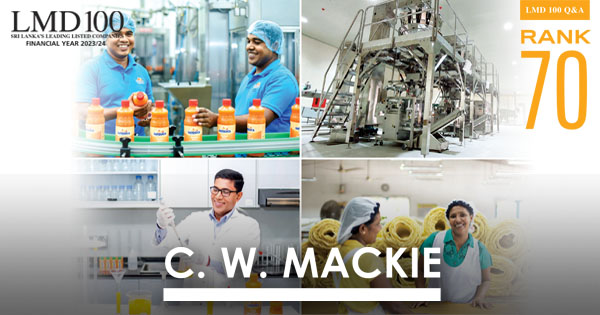LMD 100 Q&A
PRINTCARE
Q: What is the role of corporates in Sri Lanka’s economic revival?
A: The country is going through what is perhaps its most difficult period economically. Coming out of a devastating global pandemic, we have neither sufficient foreign exchange nor rupees. The government does not have the foreign reserves or fiscal revenue to run the country, and so we have a very difficult and narrow path to follow over the next few years – both economically and politically.
In addition to the above, businesses are facing an outflow of talent not seen since the peak of the war. Sri Lanka has hit the proverbial rock bottom.
As a corporate in this environment, the question we must ask ourselves is: How can we best use the resources in our value chain, in a sustainable manner, to improve our global competitiveness; bring forth the next wave of innovation; and consequently drive exports; thereby contributing to the economic growth of the country? And how can we do this whilst navigating the numerous external challenges thrown at us?
I think corporates also have a major role to play in bringing some of our governance best practices to the way the country is run. Many corporates run their businesses in a way that holds their leaders accountable for good governance and results whilst cracking down on internal corruption. Yet, many of these corporates don’t advocate the same standards for the state.
As we have seen on the other hand, widespread corruption can be cancerous for the economic well-being of a country. It can encourage monopolies; disrupt fair competition; and most importantly, disincentivise fair market conduct. Corporates are more likely to behave ethically and act against corruption if they are confident their competitors also adhere to the same ethical standards.
Business associations and chambers of commerce can potentially offer a good platform for businesses to engage in the fight against corruption collectively and level the playing field between competitors.
There are several ways to do this: facilitation of collective action, joint advocacy for reforms, and encouragement of more transparency and accountability in government decisions, as well as the promotion of corporate integrity among its members.
Q: What is the focus that printers must place on driving innovation in terms of products and processes?
A: Product and process innovation are key focus areas for our business – as it should be for the industry too. Printcare has been instilling innovation both internally and externally.
Internally, we have put in place dedicated teams that focus on innovation in packaging design and materials used. Our goal is to create a significant portion of our turnover from new business lines and new markets. This challenges us to look at new high value segments as part of our daily process.
This has resulted in the birth of our new digital printing division that helps our customers develop prototypes rapidly and reduce their ‘go to market’ time, whilst helping SMEs access world-class export quality packaging at lower minimum order quantities (MOQs) and fixed costs.
Externally, we have been building partnerships with key stakeholders in our business and driving local cluster development. We have been improving available skills in the workforce, developing a local supply base and supporting institutions in the region.
Many corporates run their businesses in a way that holds their leaders accountable for good governance and results whilst cracking down on internal corruption
Q: And how are printers being influenced by regional and global developments?
A: For decades, businesses sought out cheap, efficient supply chains to produce goods for global export, in addition to access to growing young populations in developing countries to spur sales. They operated on the assumption that security and political tensions between countries wouldn’t obstruct their operations.
Entities like these are still looking for cheap, efficient and young markets; but now, they also want safety, which for many has meant diversification away from direct tension between the world’s great economic powers.
This thinking has helped businesses in South and Southeast Asia gain market share as businesses diversify their supply networks, which in turn has opened up new opportunities for enterprises that can now fit into these new value chains such as packaging.
What we are witnessing is a reshaping of globalisation. This transformation period will play out over the next three to five years and Sri Lanka cannot afford to miss out on positioning ourselves to benefit from this reshaping.
Printcare has been focussed on serving a global market since its inception over 40 years ago, and has a history of competing with and benchmarking itself against global and regional competitors.
This has helped us to develop a strong culture of innovation, productivity improvement and continuous investment in technology, which we believe will help us through what is looking more and more like global recession in 2023, whilst setting us up for the many opportunities emerging around us in India, East Africa, the Middle East and Southeast Asia.

Executive Director
Q: Would you agree that organisational performance and environmental sustainability should go hand in hand? If so, how is this need being addressed by your organisation?
A: We believe environmental sustainability is one of the key growth opportunities of this century. Consumers are now demanding products that have minimal negative impact on the ecology and longer life cycles. Governments are also imposing more stringent regulations, both in the countries where goods and services are produced, and nations where they are consumed.
Businesses that embrace this change will position themselves for continued growth in tomorrow’s economy, reap the benefits and find themselves in a position of leadership.
At Printcare, we do not wish sustainability to be merely a programme or lots of good intentions but a set of behaviours and actions that are integrated with our business strategy.
We ask our customers on a regular basis what packaging shifts they can foresee in their focus markets based on anticipated consumer perception and regulatory changes. Then we identify potential growth opportunities for which we can uniquely position ourselves to provide winning solutions.
Proactively identifying these sentiments and potential shifts could allow packaging suppliers to stay on top of trends as they develop, and become thought partners by supporting customers to revamp their packaging portfolios, and ultimately creating significant growth opportunities.
Many corporates run their businesses in a way that holds their leaders accountable for good governance and results whilst cracking down on internal corruption
Telephone 4829292 | Email krishna@printcare.lk | Website www.printcare.lk








